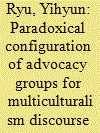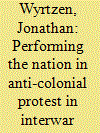| Srl | Item |
| 1 |
ID:
187165


|
|
|
|
|
| Summary/Abstract |
This article demonstrates that the paradoxical configuration of groups supporting multiculturalism in South Korea stems from uniquely Korean experiences of colonialism, territorial division, and modernization. Unlike other societies, conservative political force advocates for multiculturalism and blames nationalism for its intolerance. On the other hand, its political counterparts have lingered on Korean nationalism, often presented as an antipode of multiculturalism. For exploring the antecedents of South Korean multiculturalism that contributed to shaping such configuration, I use the Foucauldian theoretical concept of governmentality and genealogy. Governmentality focuses on the conditions or circumstances under which policy problems are produced and genealogy allows us to trace back to its origin of the discourse, for de-familiarizing and dismantling the widespread perception of South Korean multiculturalism. This article explores how historical and geopolitical conditions have shaped engagement with multiculturalism discourse and how the emergence of post-nationalism laid the foundation for multiculturalism policy.
|
|
|
|
|
|
|
|
|
|
|
|
|
|
|
|
| 2 |
ID:
123124


|
|
|
|
|
| Publication |
2013.
|
| Summary/Abstract |
This article applies a process approach to the study of nationalism, analysing anti-colonial protest in interwar Morocco to address how and why elite-constructed national identity resonates for larger audiences. Using Alexander's social performance model to study nationalist contention, it examines how a Muslim prayer ritual was re-purposed by Moroccan nationalists to galvanise mass protest against a French divide-and-rule colonial policy towards Moroccan Berbers that they believed threatened Morocco's ethno-religious national unity. By looking at how national identity was forged in the context of contentious performances and why certain religious (Islam) and ethnic (Arab) components were drawn on to define the Moroccan nation, this study offers a model for answering why national identity gets defined in specific ways and how the nation gains salience for broader publics as a category of collective identity.
|
|
|
|
|
|
|
|
|
|
|
|
|
|
|
|